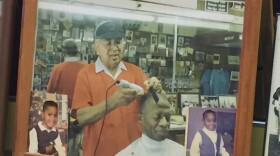This Wednesday marks fifty years since the assassination of Dr. Martin Luther King, Junior. All month long, the Alabama Public Radio news team has been examining Dr. King’s work and impact here in Alabama. You met a photographer from Montgomery who chronicled the civil rights icon. APR guest reporter Ousmane Sagara of the West African nation of Mali reported on how his countrymen remember Dr. King. And, we examined how Alabama is one of only two states that celebrates the birthdays of Dr. King and Confederate General Robert E. Lee on the same day. Now, APR’s Pat Duggins visits the city of Greensboro where a little known standoff took place fifty years ago this week, just days before King was killed…
Students from Hale County High school are heading into a small shotgun style house. This home sits on a dirt road along Main Street in the town of Greensboro, about an hour south of Tuscaloosa. It’s a museum now, but back in the late 1960’s, it was a safe house for civil rights activists, including Dr. Martin Luther King, Junior. The relationship between King, the safe house, and its owner didn’t get off on the right foot…
“He was not impressive at all. Not what I expected...you know," says Teresa Burroughs. She's eighty eight years old. Her home sits next door to the safe house museum. She owns both. Burroughs says Martin Luther King, Junior just wasn’t the kind of man she thought one of her best friends would marry…
"I just imagined her with a football player...probably six foot something, you know. Martin was not like that."
The friend Burroughs thought would marry a football player was named Coretta Scott. The future Mrs. King was born in the town Marion, about half hour east of Greensboro. As young ladies, Burroughs and Scott would talk about boys, and about the future. Burroughs says there was someone her friend said she wanted to grow up to be like… opera star Marion Anderson.
"She (Coretta Scott) had a beautiful voice… She used to say I’m going to another Marion Anderson. And I'm gonna tour the world...and sing. And you're gonna to read about me, cause I'm gonna be a star. That was the way she was talking. And, I said "alright."
"She gave up her dream, and took on his," she says.
Burroughs' impression of Martin Luther King, Junior got better, though. Once he did what many people say he did best…
"The fact is...that freedom is never given voluntarily by the oppressor..." said King to an audience in New England.
"The spirit seemed to enter his body and came out through his voice," recalled Burroughs. "And, something in it...moves you, moves a person. After we got to know each other better...he was alright."
King spoke before Union healthcare workers in New England in March of 1968. It wasn’t the only talk he gave that month. Ten days later he was in Eutaw, Alabama urging supporters to elect black candidates to Congress. Burroughs says after his talk, King headed straight to Greensboro to stay in the safe house.
"It was terrible night, it was an awful night," she remembered.
The reason was because the Ku Klux Klan heard King was in Alabama. An armed group of Klansmen spent the night looking for him in Greensboro…
"They would drive slowly by. And, you could see them inside the cars. And you could see the barrels of their guns. They had the lights on the inside of the cars, and they had the lights off on the outside. They knew he was in here. And, we kept him safe."
King left the next morning. For Teresa Burroughs and King’s supporters in Greensboro, the feeling the victory lasted just two weeks. She remembered hearing the news over the radio when King was assassinated in Memphis. That’s why she made the safe house into a museum. She wants people remember what happened here fifty years ago, her long after she’s gone.










